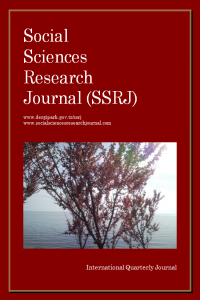SAĞLIK KURUMLARINDA ETKİLİ BİR İLETİŞİMİN ANAHTARI OLARAK SOSYAL MEDYA YÖNETİMİ
Sağlık Kurumları, İletişim, Sosyal Medya, Dijitalleşme, Hizmet Kalitesi.
SOCIAL MEDIA MANAGEMENT AS THE KEY TO EFFECTIVE COMMUNICATION IN HEALTH INSTITUTIONS
Health Institutions, Communication, Social Media, Digitalization, Service Quality.,
___
- Bernhardt M., Alber J., and Gold RS. (2014). A social media primer for professionals: digital dos and don'ts. Helath Promot Pract.. 15 (2): 168-172.
- Chauhan B., George R., and Coffin J., (2012) Social media and you: what every physician needs to know. J Med Pract Managet. 28 (3): 206-209
- Childs LM., and Martin CY., (2012). Social media profiles: striking the right balance. Am J Helath Sys Pharm.. 69 (23): 2044–2050.
- Chretien K C., and Kind T., (2013). Social Media and Clinical Care Ethical, Professional, and Social Implications. Circulation. 127 (13): 1413-1421.
- Dizon S. D., Graham D., Thompson A. M., Johnson J. L., Johnston C., Fisch J. M., and Miller R. (2012). Practical Guidance: The Use of Social Media In Oncology Practice Journal of Oncology Practice. 8 (5): 114-124.
- Farnan JM., Snyder Sulmasy L., Worster BK., Chaudhry HJ., Rhyne JA., and Arora VM. (2013). Online medical professionalism: patient and public relationships: policy statement from the American College of Physicians and the Federation of State Medical Boards. Ann Intern Med. Apr 16;158(8):620-7.
- Fogelson NS, Rubin ZA, and Ault KA. (2013) Beyond likes and tweets: an in-depth look at the physician social media landscape. Clin Obstet Gynecol. 56 (3): 495-508.
- George DR, Rovniak LS and Kraschnewski JL. (2013). Dangers and opportunities for social media in medicine. Clin Obstet Gynecol. 56 (3): 453-462.
- Grajales FJ 3rd., Sheps S, Ho K., Novak-Lauscher H., and Eysenbach G. (2014). Social media: a review and tutorial of applications in medicine and health care. J Med Internet Res. 11;16(2):e13.
- Grindrod K, Forgione A, Tsuyui RT., Gavura S., and Giustini D. (2014). Pharmacy 2.0: a scoping review of social media use in pharmacy. Res Social Adm Pharm. 10 (1): 256-270.
- Hasty RT, Garbalosa RC, Barbato VA, Valdes PJ Jr., Powers D. W., Hernandez E., John J. S., Suciu G., Qureshi F., Popa-Radu M., San Jose S., Drexler N., Patankar R., Paz J. R., King C. W., Gerber H. N., Valladares M. G., and Somji A. A. (2014). Wikipedia vs peer-reviewed medical literature for information about the 10 most costly medical conditions. J Am Osteopath Assoc. 114 (5): 368-373.
- Househ M. (2013). The use of social media in healthcare: organizational, clinical, and patient perspectives. Stud Health Technol Inform. 183: 244-248.
- Işık, T. (2019). Sağlık İletişiminde Dijital İletişim Kanallarının Kullanımı: Sektör Acıbadem Hastanesinin Dijital İletişim Kanalı ve Sosyal Medya Hesaplarının İncelenmesi. Elektronik Cumhuriyet İletişim Dergisi. 1 (2) , 147-162 .
- Lambert K. M., Barry P., and Stokes G., (2012). Risk management and legal issues with the use of social media in the healthcare setting. J Healthc Risk Manag. 31 (4): 41-47.
- MacMillan C. (2013). Social media revolution and blurring of professional boundaries. Imprint. 60 (3): 44-46.
- Moorhead S.A., Hazlet D. E., Harrison L., Carrol K. J., Irwin A., and Hoving C., (2013). A New Dimension of Health Care: Systematic Review of the Uses, Benefits, and Limitations of Social Media for Health Communication. J Med Internet Res. 15 (4): e85.
- O’Hara B., Fox B. J., and Donahue B., (2003). Eczacılıkta sosyal medya: Social media in pharmacy: heeding its call, leveraging its power. J Am Pharm Assoc; 53 (6): 561-564.
- Peck J. L. (2014). Social media in nursing education: responsible integration for meaningful use. J Nurs Educ. 19: 1-6.
- Pirraglia P. A., and Kravitz R. L. (2012). Social Media: New Opportunities, New Ethical Concerns. J Gen Intern Med. 28 (2): 165-166.
- Von Muhlen M., and Ohno-Machado L. (2012) Reviewing social media use by clinicians. J Am Med Inform Assoc. 19 (5): 777-781.
- Yayın Aralığı: Yılda 4 Sayı
- Yayıncı: Denta Florya ADSM Limited Company
Merkantilizmin Osmanlı Devleti-Avrupa Ticari İlişkilerine Yansımaları
Aspir Üretiminin Ekonomik Analizi
SAĞLIK KURUMLARINDA ETKİLİ BİR İLETİŞİMİN ANAHTARI OLARAK SOSYAL MEDYA YÖNETİMİ
Akılcı İlaç Kullanımı ve İlaç Takip Sistemi
Endüstri 4.0 Farkındalığı ve Teknolojiye Yönelik Tutumun Yapısal Eşitlik Modeli ile Analizi
ÖĞRETMENLERİN MESLEKİ PROFESYONELLİK DAVRANIŞLARININ İŞ DOYUMLARI ÜZERİNDEKİ ETKİSİ
Mehmet AYDIN, Fahri TOPRAK, Mustafa ASLAN, Mustafa AYDIN
Şanlıurfa Ulu Cami Avlusunda Bulunan St. Stephan Kilisesi’nden Kalma Sütun Başlıkları
